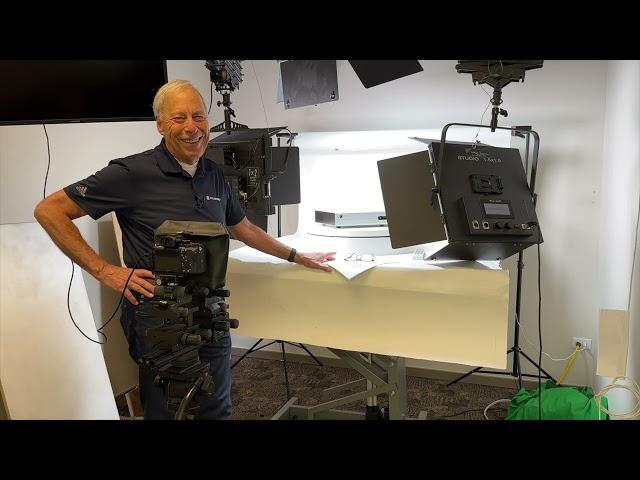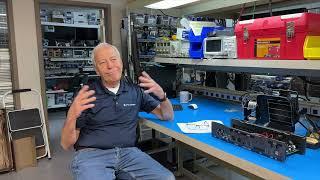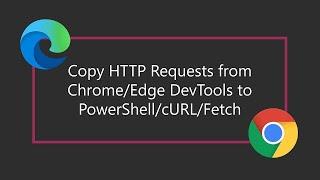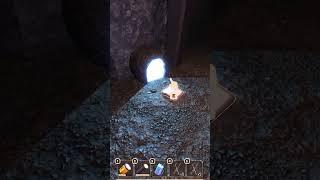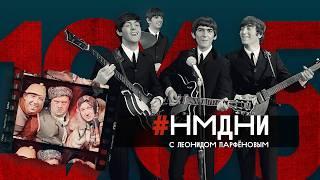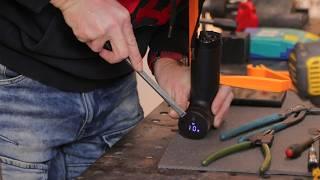Комментарии:

A modern day DAC will clean up any clock of sources it is getting. It's 2023, they can do that. If you are buying a modern day DAC that can't buffer its incoming stream with a clean clock source, simples: it's not a good DAC, it's not up to modern technology, don't buy it.
Ответить
Will there be a Sprout Gold?😂
Ответить
A strange thing that I noticed in the late 90's, perhaps 1997, is that when I compared a copied CD-R, that I've burned in 2x, it sounded better than the original.
I thought it was so strange so I let a "Hi-Fi Friend" also listen and say which one he thought had the best sound and he thought like me, that my newly burned CD-R sounded better than the original.

In my recording studio I bypass the Windows audio driver for the driver used by my audio interface, the difference is very noticeable to me so I agree with you.
Ответить
Bits is bits
Ответить
I would visit but I'm on the other side of the world to Boulder, USA.
Ответить
I dont think there has been any proof showing any extra jitter playing out of a computer vs not.
Ответить
Computers have far less jitter and noise than any CD transport, there is no way a HiFi product can compare to the kind of clock stability that you have with a modern CPU. It is just that most people do not get the benefit of this because they use Windows or MacOS. Any audio software will communicate with the computer operating system to send the data to an external DAC (at the this point your are at the mercy of the OS and driver software). As you correctly say the computer controls the clock and delivery of the data stream but Windows and and MacOS do a poor job of this. I would highly recommend using Linux and the ALSA sound system (not Pulse or Pipewire) - you will be amazed. Strawberry is my music player of choice and I tend to store all my rips in Apple lossless codec format.
Ответить
thank you
Ответить
NOT AGAIN......
Ответить
Laptops are notorious EMI and EFI absorbers!!
Ответить
This nonsense is why people wont buy into stuff that genuinely does make a difference to SQ, like Cables.
Trying to pretend that there is any difference between o's and 1's is a huge smoke screen. When you can physically bit compare the data on a CD with the data as it enters your Dac and see its exactly the same (of course as the transmission protocol ensures there's no errors), then any suggestion that there's errors is simply not borne out by simple testing.
Whilst we can talk about jitter errors, almost any good DAC will reclock the data bits, and many will use very accurate clocks to do so, so as long as the bits are the same (which they are), then they will be re-clocked and used for conversion the same.
Buying into any of this nonsense leads to people selling you $500 network switches - its prime stupidity to bamboozle the stupid or vulnerable out of their money.
I use a very good ripping program which bit compares and tripple checks my data is bit for bit as it is on the CD. When I use roon to serve this data from my server to my DAC I am absolutely getting exactly the same bits delivered to my DAC that a CD player will deliver. My Auralic DAC will reclock the data to ensure no jitter before passing to the conversion chips.
Not surprisingly, my ripped files sound EXACTLY the same as if they were playing on any one of the CD players I still have lying around.
I can hear huge difference in cables, in well isolated equipment and in cleaner power. But I've never heard a shred of difference between a well ripped flac and a CD. Because there is no difference, definitively. People who try to argue something that, for once, is black and white are doing the whole audio industry a huge disservice and showing the many people that suspect as much that yes, HIFI stalwarts are happy to peddle stupidity and sell snake oil if it makes a quick buck.

Bits are indeed identical... Sound is analog hence the analog circuit matters.
Ответить
I think the Cross Interleaved Reed-Solomon Coding (CIRC) is a big part of different sound from CD vs Computer file. Less work for CIRC equals better sound. For me a CD played from my drive (Marantz SACDM3) always sounds better than a ripped.
Ответить
But the difference in what we hear is due to the quality of the DAC and not the CD/DVD player itself, correct? Meaning a CD played through a cheap CD player or an expensive player will sound almost no different when sent through a great DAC, yes?
Ответить
💯
Ответить
But isn’t this just something to solve in the DAC? Every self respecting pro interface has a buffer anyway and an internal clock source, so why can’t hifi audio DACs do the same?
Ответить
Taking a cd out of its case and loading it in a good quality player is almost as much fun as pulling a record from a sleeve and dropping a needle. I have thousands of cd's loaded in my laptop... and I never listen to them. Physical media all the way, every time
Ответить
Why no DSP like Legacy Audio has in their DAC DSP Preamp called Wavelet. Also they have speakers that inclued teh wavelt, for teh same price as your FR30 Hmm and they have built in amplification for bass. Legacy is a better deal for superb quality speakers
Ответить
Not to mention that FLAC is a compressed, lossless but compressed nonetheless. That means there is decompression latency introduced into the stream
Ответить
The audio output from my DAC sounds identical to me whether I provide a data stream to it via coax from my Oppo CD player or via USB from the same CD ripped to my MAC Mini computer. The DAC reclocks both data streams before conversion to analog so it seems to me that both sources sound the same because the data actually is the same, and the subsequent reclocking of that data eliminates any timing variations. This is all good because it simplifies my life by not having to chase imaginary white rabbits down infinitely deep holes.
Ответить
There's never any talk of isolation from vibration, when using a computer to play music. Are computers immune to external vibration degrading the sound? I myself & others have gone to great lengths and thought over what to place our cd players on, and it has paid big dividends. Probably more % of improvement in sound quality than you are likely to make with upgraded electronics.
Do we really need to move our music around from one thing to another like musical chairs? For me a cd player and a turntable to come home to is enough, and tape deck hooked up sometimes.
Listening to music here there and everywhere; doesn't that take away the "specialness" of sitting down in the evening and devoting an hour and a half of attentive listening to and enjoying music? Does music have to be with you everywhere? All the time? When it came out that Mofi was digitally recording master tapes and making digital lps, some said "why not just get the SACD instead!" Having no understanding that Mofi's digital recorder has a sampling rate many many times the sampling rate of SACD. If there is something to mis-understand about audio, you can count on it like clockwork, that there will be people that will mis-understand it. I don't understand everything, but at least I make sure to not mis-understand "everything". As Jerry Seinfeld would say ,"Who Are These People?"
Toothpaste has been new and improved for over 70 years now.

Why you always mention USB from PC?
I use optical when I bother turning on the PC.

I remember a while back that a person believed that a ripped CD sounded better than the original CD.
Ответить
This company should be named BS Audio.
It’s staggering that in 2023 so many audiophiles can still be suckered into this stuff.
It’s easy to educate yourselves on these topics. There is a World Wide Web with so much scientific data and evidence out there to truthfully answer every question that gets asked on here.
Why ask a story telling salesman about technical questions? Does anyone really take what is said in these videos literally?

Some of the best digital audio you will hear comes from early 90s minimal CD portable players...limited buffers no antiskip shortest signal path fewest connections.
Ответить
I have all my CDs ripped to my iMac hard drive, and high res files there as well, and use Roon. No comparison. Well, the CD is nice and has its place, but I never use my CDP and it is a TOTL Denon. The treble is better, more refined and has more clarity. I have been explained that the fact the CDP has only one pass to get it right compared to a HD which has all the time in the world (it has a buffer system) makes the difference. And my computer is not audio specific, and I wonder how much better if it were. And my iMac is stock, no upgrades or hardware changes. Once I tried computer audio (and Mac has the edge here) and added Roon, I don't see ever going back. I will always have the disc as a backup, but the days of a CDP as my core source are over.
Ответить
As a Hi-Fi enthusiast of 44 years listening experience, the BEST sound I've ever heard came from the PC and through a valve / tube amp! It was mind-blowingly true to life, smooth, with bass and vocals to die for! Who cares about the technical specs, when it sounds that good?
Ответить
🤡
Ответить
FLAC is noise compared to uncompressed files. When I switch to uncompressed sessions, I fall asleep, because it's so relaxing.
Make sure your player software is using ASIO, too. Otherwise, even kernel streaming will sound like it's fake, although still only to a minimum compared to WASAPI. Oh, and good luck unless you're player is Audirvana. The rest sound wrong. Especially the default software player of your streaming service.
The guy who thought it should be musicians, and created the ASIO hardware interface because of it, makes all other programmers geeks about audio playback.
OS creators should make all audio output through ASIO by default.

There is no such thing as perfectly ripped pcm audio. All those cheap drives you mentioned have no real support for the cd red Standard. They are cd yello book standard. By definition the are compatible but not even close to the same. There is a reason apps like eac exist, that also compare your rip quality to online Library to make sure you get as close to what's on cd as possible. There are only a handful of drives that can fully support cd red Standard on pc and they are far and few in between the rest of stuff. There is a recommended drive list on Poweramp and eac both for this purpose and can promise a direct copy of the file bought from a digital retailer will always be superior to your ripped cd copy.
Ответить
I’d I use an Airlens do i still need to use Audirvana?
Ответить
The key is to have a buffer on the cd players. One who don't have one skip some bits. And bit 17th of 24 become bit 19th. and so forth.
Until the unit resync.

what about good streamer and some DACs are asynch
Ответить
You need a $30,000 CD Transport.
Ответить
I have a oppo 203,my rega saturn r blows it out of water
Ответить
The copies were made in the late eighties/early nineties when everybody thought digital was digital. Amazing people still think that way.
Ответить
And now we have all the comments from the Experts 🤣🤣
Ответить
Hi paul ,the preamp is available in italy as soon??
Ответить
I am curious if ripped music played through a separate computer running Roon connected to a streamer will sound any different than running an HDD directly to the streamer
Ответить
You just explained how MQA works.
Ответить
I like and admire Paul, but he now consistently contracticts himself and IMHO should (mostly) give way to the more knowledgeable engineers on his staff, or elsewhere. Paul states that a file ripped to a computer and played through USB will sound different (i.e., worse) on a high resolving DAC than the CD spinning on the tranport directly into the DAC. This is generally true. Paul then states that the way to solve this problem is via Roon/JRiver and an electrically isolated buffer, before passing the bits to the DAC, which is definitely true, and is implemented in the vast majority of high end solutions today. This step solves the sonic delta between the two. Unless you thoroughly enjoy the process of searching for, handling and loading the physical media, i.e., CDs, into your player, the difference in SQ between that and a ripped file, properly isolated and properly served, is no longer significant/measurable.
Ответить
Hi Paul, can you buy ( not ripped your self) music on Micro SD cards?
Ответить
Paul, I have always gone off your bits are bits are bits advice. With that in mind, when I rip a CD to ALAC and play it via Airplay to an Airport Express v2 receiver with firmware downgraded to Airplay 1, this ensures it is 16/44 (Airplay 2 is another story). Then run that via Toslink to amp, it sounds identical to CD. Actually, often better as I only have old CD players that sound best via RCA and builtin DACs. Those 1990s Phillips and 2000s JVC engineers knew their stuff.
Also, I think this is ultimately more to do with exclusive mode. Which Apple has not done the user experience with very well. (Only iOS is exclusive mode but comes with some caveats for Airplay 2 receivers.) But I think Tidal, for example, is exclusive. So when you play Tidal via Airplay, it forces Airplay (1) to be used and you get a cleaner lossless version for sure. My little firmware downgrade trick forces iOS to play Airplay (1). I also send this via ethernet and have wi-fi on the Express turned off. The other services you mention are also exclusive. I think this is key. Working around the Apple or whatever streaming DSP and allowing the service or tricky user (me) to send clean rips as ALACs or FLACs to a system that will cleanly accept it.
BTW: I also do same to another downgraded firmware Airport Express v2 in my office but from a Mac. So it is for sure ALAC strait to the DAC, as the Mac via system finder Sound menu will output exclusive mode Apple Music (my ALAC rip library or Apple) to Airplay. But I think in a recent update, Apple has allowed this choice to be exclusive in the Music app or, it might just be AAC 256 which just that darn good!

Ooooh the stellar gold. Fancy
Ответить
Hello. I have compared and played a bit with settings and software on a computer.
You make a lossless copy of an original store bought music CD.
and plays it through the same dac. and compares with a CD player through the same dac. then you won't hear much difference.
Yes USB. has a lot of current noise through 5v and GND. But if you use optic cable, you eliminate this.
you must remember that the sound card and optical output are set to 44.1 and 16 bit.
You can also use a program called
AIMP which is a sound player for windows and set settings on WASPI to eliminate the windows sound engine.

This is hogwash. let's assume the bits have noise. They are identified and stored in a internal buffer. this buffer is DECOUPLED from the source. In other words, the noise introduced in the original signal is not stored or affecting the buffer that the DAC actually uses to convert to analog. Do not believe this nonsense. Anyone with a bit of engineering background can tell this.
Ответить
Using a computer to send audio by cable to a DAC is a 2010s thing. Modern streamer-DACs get the bits over a wired/WiFi network from a streaming service like Qobuz, or a music server on the network like Roon. So, concerns about jitter, computer noise, etc. go away. In my experience, this always sounds better than a CD player because it avoids the CD motor noise.
Ответить
I stopped watching Paul's videos months ago, but if I see one on a topic I find interesting, like this, I will click on it just to read the comments. I'm never disappointed!
Ответить
Hi Paul, I´m Tadeu from Piracicaba, Brazil. I´m just a listener, and I have no tech knowledge. Is there any way to normalize jitter and noise? Another question: The same occurs when you digitalize a vinyl?
Ответить